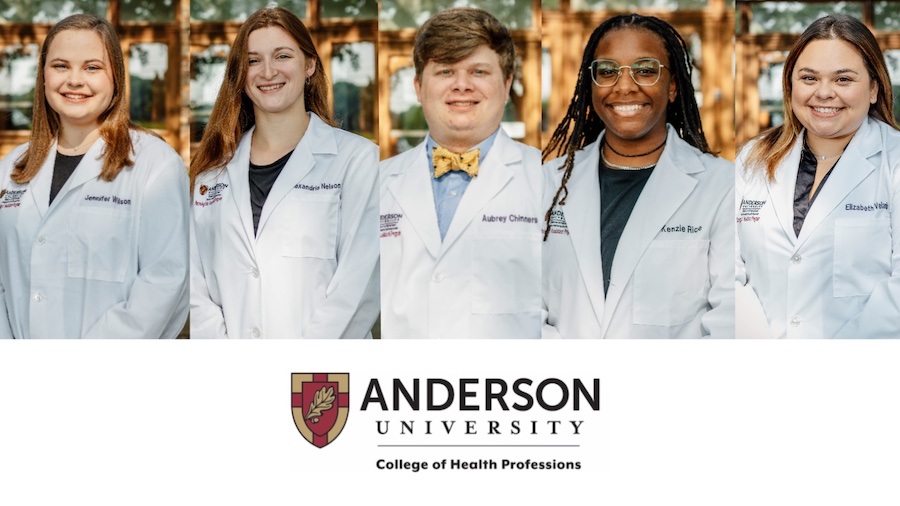There are few Pathologists’ Assistant programs across the nation and only one in South Carolina—at Anderson University.
On August 11, the Pathologists’ Assistant program of the Anderson University College of Health Professions held a white coat ceremony for the first cohort of students who enrolled in the graduate program this past fall.
The white coat symbolizes the responsibility of each practitioner and underscores the importance of superior care and compassion for patients. Whether the patient is alive or deceased, Director of the Pathologists’ Assistant Program and Chair of the School of Clinical Laboratory Sciences, Derek Nelson, says it’s still important to provide the best care possible when handling tissue samples.
The next step for the first cohort of students is a year of clinical rotations across the region.
“Our first cohort is moving into their clinical year,” Nelson said. “They’re going to be rotating with coroners offices, private and hospital laboratories for their surgical rotation as well. They’ll be doing autopsies for the forensic unit. They also will be doing cancer resections and lymph node biopsies for their surgical rotations.”
“Honestly, the thing that stands out to me the most about what’s happened in the last year is how I’ve grown and how this program has pushed me to keep going even when I felt like this was a lot,” said Jennifer Wilson, a student in the Pathologists’ Assistant program. Wilson will start her clinicals in the fall at AnMed.
“I’ve gained so much and have been able to retain it and apply it to each semester. Even though it’s been tough just because it’s a fast-paced program, the staff, our professors—they’ve been great,” said Elizabeth Velandia, who will start her clinicals in a dermatology office in Greenville and later the DeKalb County (Georgia) Medical Examiner’s Office.
Pathologists’ Assistants, Nelson says, are very much in demand, with starting salaries usually north of $100,000. Daily, Nelson gets job offerings for full time positions from across the United States.
“I have one clinical site where I met with the lab manager. I asked them ‘how many students can you take’ and he asked ‘how many can you give us?’,” Nelson said. Another area where there are opportunities, according to Nelson, are tissue banks, where there is a demand for researchers looking for certain types of cancers or some rare genetic diseases.
“They’re able to do genetic testing, and then they’re able to pull this info from across the nation to also help with treatment plans,” Nelson said. “It’s pretty exciting stuff, especially when it comes to molecular genetic testing that is constantly changing.”
Pathologists’ Assistant students participating in the White Coat ceremony were Aubrey Chinners, Alexandra Nelson, McKenzie Rice, Elizabeth Velandia and Jennifer Wilson.
The Pathologists’ Assistant program at Anderson University will welcome a new, larger cohort this fall. The program is also hiring a new faculty member.
Pathologists’ Assistants are allied health professionals who are mid-level healthcare providers. The Master of Medical Science in Pathologists’ Assistant (MMSPA) program at the Anderson University College of Health Professions is an 80-hour program that consists of a year of academic didactic instruction at Anderson University, then a year of clinicals. Details can be found online.

